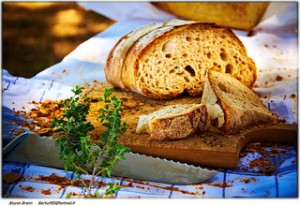Recently I took up making my own bread from scratch. No mixes. No breadmakers. Just flour, yeast, salt and whatever else a particular recipe calls for.
Why did I take up baking bread? Because I love good crispy fragrant dark bread, the kind made from whole wheat and especially rye flours. While I can find excellent bakery products a short drive from my home, with the right aroma, crunchiness, and look, I felt that–baking my own bread–I would, 1) know exactly what is going into each loaf, and, 2) eliminate the occasional trips to the store that ended up with me finding my fave bread out of stock.
I’ve been baking for about a month now. I’ve experimented with different recipes. I haven’t yet achieved my vision of the perfect loaf–but I’m getting there. And even my “misses” are quite good, if I do say so myself. (Actually my hubby says so too. He even happily ate my first failed rye loaf, the one which turned out more like a giant rye cracker.) I continue to experiment with recipes, ingredients, and the mixing, kneading, and baking processes. I read books on baking bread and watch videos. The bread is getting progressively better.
As I worked with the process of transmuting base ingredients – flour, water, yeast, and salt – into leavened bread (bread that rises versus flat bread), it occurred to me that there is an analogy between this kind of breadmaking and writing. As writers, our base ingredients are imagination, feeling, and the desire to communicate and connect with our audiences. Once we sit down to write, it becomes clear that we can’t just throw those raw ingredients hodge-podge into the hearth fires and bake them. Breadmaking is a process.
So what are the lessons breadmaking can teach a writer?
- All writers start with raw ingredients. It’s how you combine and work the ingredients that ensures success.
- Expect struggle. Bread dough is an amazing substance. It truly is alive and almost seems to enjoy “fighting back” against the baker. Watch baking videos and note how bakers seem to relish beating the dough into submission, literally, with their fists and rolling pins. As writers shape their novels, the ideas that seemed so brilliant at the outset often lose their luster. A writer needs to beat that material into submission. See the next point.
- The baker who prevails produces great loaves. There are times in the baking process that a newbie baker is sure she is doing everything wrong, when the dough looks like a gloppy mess, sticks to everything except the kneading board, and simply refuses to behave. The baker who keeps going witnesses a magical transformation. The dough literally shapes up, guided by patient fingers. For a writer, thinking time that employs her resourcefulness and creativity are the yeast and the kneading that gets the “dough” of a story to behave.
- At critical points, the yeast takes over. We are not in it alone. Call it the Muse. Call it what you will, but writers who stick with their stories experience breakthroughs in plot and characterization and pacing. The universe loves the writer who is a patient and cheerful plugger.
- Bread is very forgiving. Despite its feistiness, it becomes apparent that the bread you’re shaping wants to work with you – if only you persist. Good bread, as a matter of fact, is more a result of persistence than of perfection. In the same way, those books you have envisioned want to be written. You don’t need to be perfect as an author, but you do need to stick with your writing.
- The loaf is done when it’s done. You want to make sure that your bread has been thoroughly baked. You can’t tell just by looking at the crust. The recommended test is to thump it – rap at the bottom center of the crust. You want to hear a nice hollow sound which means that the dough in the center has cooked as well as the dough on the outer edges. Writing is re-writing. Don’t stop working on your project until it’s properly “baked.” (At the same time, don’t over-work it. Bread can be spoiled by letting it rise one time too many.)
- There is no one right way. You only need to take a look at the huge variety of breads that are out there to realize there are a zillion and one ways to create great bread. Ditto for writing a novel.
- Finally, with each loaf she shapes and produces, a newbie baker gets better and better. It’s the same with writers. The more you write (and read), the better (and faster) you get as a writer.
Happy Writing!
Image: courtesy of Moyan Brenn via Flickr


1 Comment
What a cool idea this was. Each point is spot on…Thank you for the encouragement.